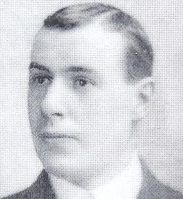William "Bill" Sawers

Billy Sawers seems to have developed a remarkable reputation considering how few games he is reported to have played and how many goals he scored in them. In part it is due to lack of data both from the start and end of his playing career but then it is also because that career was somewhat stop-start, even tempestuous as was perhaps his life in general.
It is said that he was born in Glasgow. He was not. His birthplace was Kilmarnock, as it had been for his father, a Cabinet Maker. His mother had come from nearby Stewarton but the whole family in about 1888, Billy aged sixteen or so, moved to Glasgow and the Gorbals.
So it seems that Billy, a message boy in 1881 at thirteen and himself a cabinet-maker a decade later would have learned his early football in Killy playing initially at inside-left or centre-forward with local junior side, South-Western ,and topped it off by the Clyde. Certainly by twenty he, with elder brother, Alex, at full-back was turning out for Clyde F.C. just a couple of miles up the river from where they stayed, in what, with four seasons at Barrowfield, would prove the most settled years of the dozen or so he played in total.
However, in 1890 it was clear that he was attracting attention from Down South. That January he was recruited by Sunderland Albion to play in the first round of the FA Cup, in which his team defeated Bootle 1-3 away but was disqualified due to breaking rules on professionalism, he himself suspended and returning north to Clyde once more. However, once reinstated he did try again and in 1892 was recruited by Blackburn Rovers. In part the move may have been encouraged by his brother also heading over the border and to neighbouring Burnley, but neither was to stay. Alex made just two appearances and looks to have returned home. Billy did better with twenty-four starts and eleven goals, would stay in England but for the following campaign take his talents still in the English top flight but to Stoke, where he seems to have played as second choice of three inside-forwards.
Perhaps that was enough again to look elsewhere and this time he was signed by Dundee, essentially remaining at Dens Park once more for two seasons with in the middle a short, second dalliance back with Stoke but with a possible good explanation for its brevity. And his time on Tayside was initially to be his most productive footballing period. The team was at the end of the season to finish safely but in January in the last eight of the Scottish Cup it had defeated Celtic, he scoring the goal, albeit that in the semi-final he missed a penalty that would have taken the club to the final. And in March he was to receive his first but only cap.
Yet the wave of success was not to last. Almost immediately after the second episode in The Potteries and return to Dundee came a loss of form and a falling out with his Scottish club. Quite in what order is unclear. Exasperated The Dee allowed him from February for the last three months of the 1895-6 season to leave for Kilmarnock. It seemed on the face of it a step down but there was background. On 14th February in The Gorbals William Sawers, journeyman cabinet-maker and giving the Glasgow address of his parents as his own, married Glasgow-girl, Elizabeth Agnes McKean. The couple would settle in Dennistoun, he would re-join his first senior and now nearest club, Clyde, for a season and then give up football altogether, it is said to concentrate on running the sports shop he had and on the same street again as his parents.
In fact the sports business was to fail and he was to return to cabinet-making. In addition the marriage produced no children and there might have been problems. In 1911, aged forty-one, he was back living with his parents. But by 1921 the couple was reunited and living once more in Dennistoun, from where in 1927 he was taken to hospital, dying there, at not quite sixty, of cancer. He is buried in Glasgow's Eastwood New Cemetery.
Birth Locator:
1868 - 6, St. Marnock St., Kilmarnock
Residence Locations:
1871 - 17, Union St., Kilmarnock
1881 - 31, St. Andrews St., Kilmarnock
1891 - 234, Cumberland St., Hutchesontown, Glasgow
1896 - 99, Eglinton St., Gorbals, Glasgow
1901 - 156, Sword St., Dennistoun, Glasgow
1911 - 90, Abbotsford Place, Gorbals, Glasgow
1921 - 459, Dukes St., Dennistoun, Glasgow
1927 - 326, Duke St., Dennistoun, Glasgow
Death Locator:
1927 - Western Infirmary, Glasgow
Grave Locator:
Eastwood New Cemetery, Glasgow
Back to the Killy Trail
or the SFHG Home page
© Copyright 2022-2025. All rights reserved/Todos los derechos reservados.
Any use of material created by the SFHG for this web-site will be subject to an agreed donation or donations to an SFHG appeal/Cualquier uso del material creado por SFHG para este sitio web estará sujeto a una donación acordada o donaciones a una apelación de SFHG.
We need your consent to load the translations
We use a third-party service to translate the website content that may collect data about your activity. Please review the details in the privacy policy and accept the service to view the translations.
